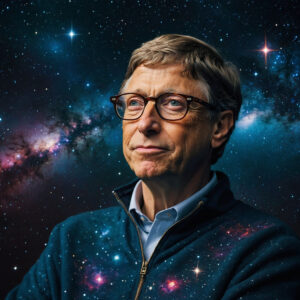 Bill Gates has a series on Netflix called “What’s Next? The Future with Bill Gates”.
Bill Gates has a series on Netflix called “What’s Next? The Future with Bill Gates”.
Join visionary philanthropist Bill Gates as he delves into pressing global issues and uncovers cutting-edge technologies that will transform the world.
When I first heard about this series, I immediately thought of The Road Ahead, Gates’ 1995 book that was supposed to be a crystal ball for all of us mortals. Infamously, that book – written on the very eve of the explosion of the World Wide Web, at a time when people were beginning to flock to the new medium – barely acknowledges the WWW, giving it only four brief mentions.
At the same time, an idea hyped in the book – digital agents – was still far in the future, and arguably still is. Yes, Siri or Alexa (or, if you’re a Microsoft diehard, Cortana) can help but they do not learn about your needs and wants and tune themselves the way a human assistant would do. We are arguably on the cusp on that technology now, but it’s 30 years after The Road Ahead.
Another big piece missing from The Road Ahead was the rise of mobile computing, which came along about a decade or so after the book. To miss the WWW and mobile computing means that Gates was no better at predicting the future than anyone else.
And to be fair, it’s something no one is really good at. Even Steve Jobs, father of the iPhone and much of the mobile computing vision, got several things wrong. He originally saw no need for an app store, for example, or for cut-and-paste on mobile. And of course the iPhone was released after several earlier mobile flops (e.g., the Newton). Predicting the future is very hard.
Gates’ Crystal Ball
When I was a Solaris sysadmin, I heard Sun engineers and salespeople often comment that “Solaris is the Microsoft Windows crystal ball”. It seemed like every edition of Microsoft’s OS incorporated things that have been pioneered in other platforms.
Microsoft’s superpower was never bold innovation, but rather refinement. An excellent book on this idea is Rick Chapman’s highly entertaining read, In Search of Stupidity. He demonstrates how many software companies (Lotus, Ashton-Tate, Netware, Borland, Microprose, and many others) committed horrible technical and marketing mistakes that blew up their market-leading positions. Microsoft was generally there to observe how they failed and pick up the pieces.
Chapman nicely details how the old “Microsoft won because of their monopoly” is nonsense. Microsoft won because it executed well and others didn’t. Paradox, for example, at one time had a commanding lead in the spreadsheet market. Ashton-Tate had a monopoly on desktop database software for PCs (DBase). Both these companies made stupid decisions, while Microsoft released editions of Excel and Access that people liked, and continued to listen to customers and incorporate features people wanted.
So Microsoft was never a “one step ahead” kind of company, but rather a “in step with our customers”. Gates, as leader, comes from that culture and it’s not surprising that he’s much better at analyzing something like “which diseases can we realistically eradicate that will have the most benefit” than “how will quantum computing impact computer science”.
Netflix
In the new series, Gates has five episodes, covering AI, disinformation, climate change, economic inequality, and public health. Gates interviews some celebrities, and some of his choices are odd.
For example, on “disinformation,” his choice is Lady Gaga. I’m sure there are all sorts of rumors and fake rumors about her, but I would think someone from the political realm would be far more relevant.
On AI, he and OpenAI CEO Sam Altman chit-chat, but there’s really not much “here’s where the world will be in 10 years” other than the most generic statements. Yes, AI will change things. Yes, we can see some obvious things – helping people write code, generating art, etc. But how will that really transform society?
Gates is strongest on public health and climate change, though there’s little new here. Gates is a passionate believer that technology will ultimately remedy all ills, so it’s no surprising that his views on climate change are largely that new inventions and applications of greenshoot science will save us.
The series is a celebration of the view of technocratic elites who can solve all problems by funding smart people, and the rest of us will benefit. There is some truth to that. In 1986, there were 3.5 million cases of the Guinea Worm Disease, and by 2023 it was less than 20, thanks to the Gates Foundation’s work.
However, this model is not perfect. Billionaires – even altruistic ones – are ultimately self-interested, and if they don’t find a problem interesting, it’s not funded. That’s not a good way to decide priorities.
Unfortunately, Gates’ new series is more about celebrating Andrew Carnegie’s “Gospel of Wealth” than really telling us What’s Next.























Leave a Reply